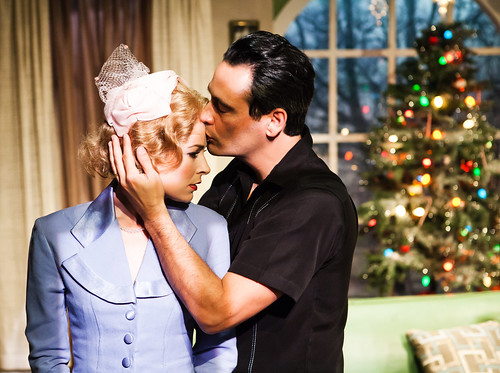Adjusting to a Period of lighter Tennessee Williams
 MacKenzie Meehan (left) is newlywed Isabel Haverstick and Johnny Moreno is her husband's friend Ralph Bates in Tennessee Williams' 1960 "serious comedy" A Period of Adjustment now at SF Playhouse. Below: Moreno's Ralph reunites with Korean War buddy George Haverstick. Photos by Jessica PalopoliAs a fading Southern belle in a Tennessee Williams play might say, "Well I do declare! What's a theatergoer to do with so many scrumptious Williams play from which to choose?"The answer is: see all of them. As we come to the end of Williams' centenary year, it seems only appropriate to be reveling in the writer's work. Marin Theatre Company recently opened a lovely production of The Glass Menagerie (read my review here), and in January, Theatre Rhinoceros presents The Two-Character Play, which Williams claimed was his "most beautiful play since Streetcar."There's no mistaking Williams' A Period of Adjustment, now at SF Playhouse, for one of his most beautiful plays. Nor is it even one of his most interesting. But it is fascinating for a number of reasons. Written in 1960, between Sweet Bird of Youth and The Night of the Iguana, Adjustment is Williams working in sitcom mode as if to prove that he's capable of something lighter.He called the play a "serious comedy" and that comes pretty close to describing it, though it's not all that funny. In fact, a lighter Williams ends up feeling strangely like Edward Albee if he were to try writing a 1950s sitcom.The Albee comparison comes into play with the setting of the play: a Nashville suburb called High Point. It's a well-appointed suburb, as so many suburbs were in 1958, but to ramp up the dramatic metaphor, this particular 'burb is built on top of a cavern, which means that everything on it is sinking about a half an inch each year. Every once in a while, the entire theater shakes (some audience members around me went into full earthquake alert), and we feel the ongoing and eventual destruction of that annual half inch.The sinking suburb is home to Ralph Bates (Johnny Moreno), a Korean War veteran who married the boss' daughter, had a kid and finds himself in utter misery at the emptiness of his life. On this Christmas Eve, his wife (described as homely by Ralph but in actuality played by the beautiful Maggie Mason) has left, taking their son but leaving all the presents under the Christmas tree.
MacKenzie Meehan (left) is newlywed Isabel Haverstick and Johnny Moreno is her husband's friend Ralph Bates in Tennessee Williams' 1960 "serious comedy" A Period of Adjustment now at SF Playhouse. Below: Moreno's Ralph reunites with Korean War buddy George Haverstick. Photos by Jessica PalopoliAs a fading Southern belle in a Tennessee Williams play might say, "Well I do declare! What's a theatergoer to do with so many scrumptious Williams play from which to choose?"The answer is: see all of them. As we come to the end of Williams' centenary year, it seems only appropriate to be reveling in the writer's work. Marin Theatre Company recently opened a lovely production of The Glass Menagerie (read my review here), and in January, Theatre Rhinoceros presents The Two-Character Play, which Williams claimed was his "most beautiful play since Streetcar."There's no mistaking Williams' A Period of Adjustment, now at SF Playhouse, for one of his most beautiful plays. Nor is it even one of his most interesting. But it is fascinating for a number of reasons. Written in 1960, between Sweet Bird of Youth and The Night of the Iguana, Adjustment is Williams working in sitcom mode as if to prove that he's capable of something lighter.He called the play a "serious comedy" and that comes pretty close to describing it, though it's not all that funny. In fact, a lighter Williams ends up feeling strangely like Edward Albee if he were to try writing a 1950s sitcom.The Albee comparison comes into play with the setting of the play: a Nashville suburb called High Point. It's a well-appointed suburb, as so many suburbs were in 1958, but to ramp up the dramatic metaphor, this particular 'burb is built on top of a cavern, which means that everything on it is sinking about a half an inch each year. Every once in a while, the entire theater shakes (some audience members around me went into full earthquake alert), and we feel the ongoing and eventual destruction of that annual half inch.The sinking suburb is home to Ralph Bates (Johnny Moreno), a Korean War veteran who married the boss' daughter, had a kid and finds himself in utter misery at the emptiness of his life. On this Christmas Eve, his wife (described as homely by Ralph but in actuality played by the beautiful Maggie Mason) has left, taking their son but leaving all the presents under the Christmas tree. It's hardly a prime time for unannounced visitors, but on this snowy night, here they come. Newlyweds George Haverstick (Patrick Alparone) and Isabel Haverstick (MacKenzie Meehan) have driven in from St. Louis – in a funeral Cadillac no less – and need a place to stay. George and Ralph were in the Korean War together, so there's little chance they'll be turned away. Even on Christmas Eve.Turns out the newlyweds aren't getting along so well. Stuck in the car since the wedding, they're climbing all over each other's nerves and wondering what in the hell they've gotten themselves in for. Damaged by the war, George shakes uncontrollably. He received medical attention, and wouldn't you know it? Isabel was his loving nurse.Director Bill English is in firm control of the material and delivers a handsome production. Nina Ball's set is a beautifully detailed '50s home, and Tatjana Genser's costumes are just as crisp and cool as they can be (cool as in coooool – not cold). The period evocation of this Period is just about perfect and adds a whole level of pleasure to the production.The same is true of the performances, which all exhibit a level of intensity appropriate for the befuddled married couples but dialed down from the usual Williams sturm und drang. Meehan is especially good as Isabel, a bright, eager woman who is trying to hold it together even though she's sinking more and more into sheer panic. These are not characters of great emotional depth – it's a comedy, remember? – but they're all damaged to some degree, all scarred by the past and petrified of the future, and these actors capture that.This Period has been adjusted, you might say. This isn't Williams' full 1960 script but rather a version edited down by Pulitzer Prize-winning playwright David Auburn. I've never read the full text, but I have seen the 1962 movie starring Jane Fonda as Isabel, and this handsome/lovely cast is much better at striking a tone of marital ambivalence that leads to a somewhat happy ending.A Period of Adjustment may not be classic Williams but it's a Williams curiosity worth seeing in this impeccable production.FOR MORE INFORMATIONTennessee Williams' A Period of Adjustment continues through Jan. 14 at SF Playhouse, 533 Sutter St., San Francisco. Tickets are $20-$50. Call 415-677-9596 or visit www.sfplayhouse.org.
It's hardly a prime time for unannounced visitors, but on this snowy night, here they come. Newlyweds George Haverstick (Patrick Alparone) and Isabel Haverstick (MacKenzie Meehan) have driven in from St. Louis – in a funeral Cadillac no less – and need a place to stay. George and Ralph were in the Korean War together, so there's little chance they'll be turned away. Even on Christmas Eve.Turns out the newlyweds aren't getting along so well. Stuck in the car since the wedding, they're climbing all over each other's nerves and wondering what in the hell they've gotten themselves in for. Damaged by the war, George shakes uncontrollably. He received medical attention, and wouldn't you know it? Isabel was his loving nurse.Director Bill English is in firm control of the material and delivers a handsome production. Nina Ball's set is a beautifully detailed '50s home, and Tatjana Genser's costumes are just as crisp and cool as they can be (cool as in coooool – not cold). The period evocation of this Period is just about perfect and adds a whole level of pleasure to the production.The same is true of the performances, which all exhibit a level of intensity appropriate for the befuddled married couples but dialed down from the usual Williams sturm und drang. Meehan is especially good as Isabel, a bright, eager woman who is trying to hold it together even though she's sinking more and more into sheer panic. These are not characters of great emotional depth – it's a comedy, remember? – but they're all damaged to some degree, all scarred by the past and petrified of the future, and these actors capture that.This Period has been adjusted, you might say. This isn't Williams' full 1960 script but rather a version edited down by Pulitzer Prize-winning playwright David Auburn. I've never read the full text, but I have seen the 1962 movie starring Jane Fonda as Isabel, and this handsome/lovely cast is much better at striking a tone of marital ambivalence that leads to a somewhat happy ending.A Period of Adjustment may not be classic Williams but it's a Williams curiosity worth seeing in this impeccable production.FOR MORE INFORMATIONTennessee Williams' A Period of Adjustment continues through Jan. 14 at SF Playhouse, 533 Sutter St., San Francisco. Tickets are $20-$50. Call 415-677-9596 or visit www.sfplayhouse.org.